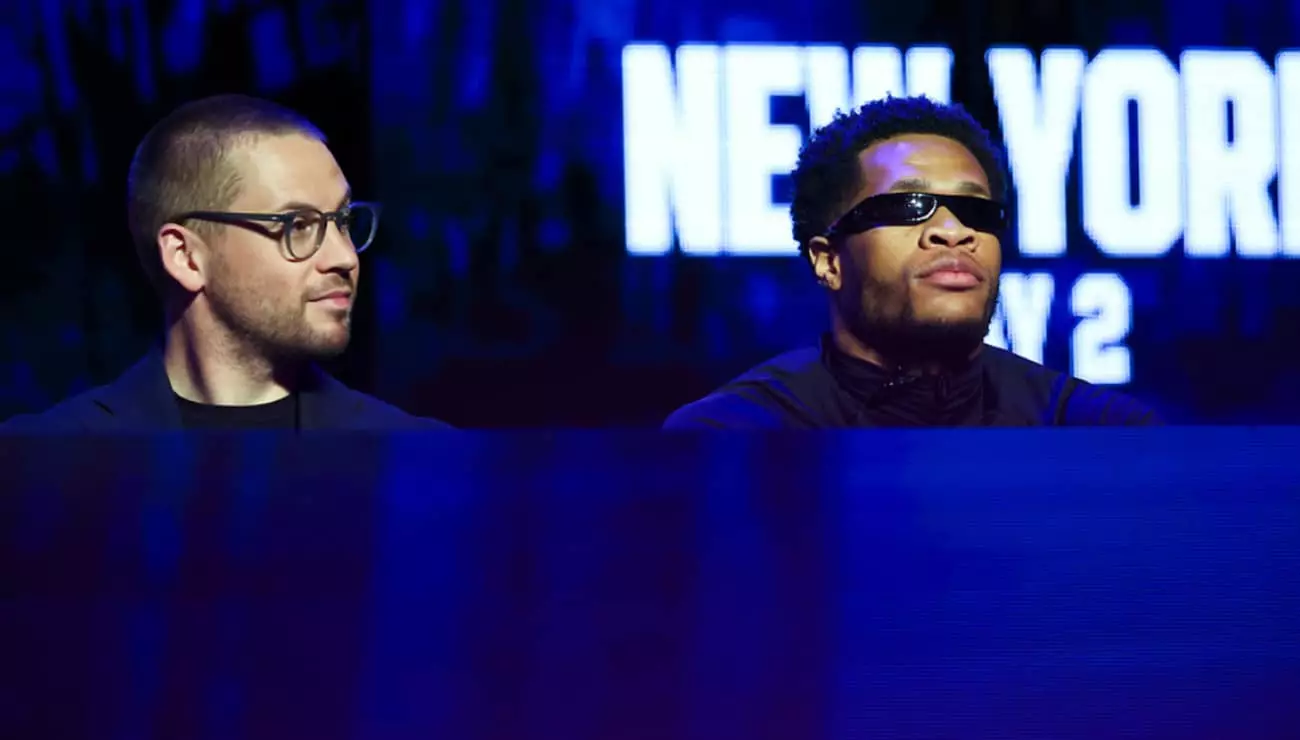In the world of professional boxing, few narratives demand more scrutiny than the psychological state of an athlete confronting adversity. Recent remarks from legendary promoter Oscar De La Hoya have cast a dark shadow over Devin Haney’s upcoming bout against Jose Ramirez. De La Hoya, speaking candidly, suggests that Haney is now merely a “broken shell” of his former self, particularly following a brutal defeat at the hands of Ryan Garcia. Such characterizations point to the critical importance of mental resilience in high-stakes competitions like boxing, where physical prowess is only part of the equation.
This narrative, while compelling, begs the question: has Haney truly lost his fighting spirit? De La Hoya’s assessment is not merely a promotional tactic but an encapsulation of Haney’s apparent shift in demeanor and performance spectrum since the Garcia fight. From an undefeated prospect, Haney now navigates the damaging remnants of that clash, which may have irrevocably altered his psychological framework as a fighter.
The Ramifications of Defeat
The aftermath of a significant loss in boxing can be transformative, often noting a pattern where fighters either rise from the ashes or become engulfed in self-doubt. Haney’s struggles since the loss—his subsequent year-long hiatus from the ring—are symptomatic of an athlete grappling with the slow erosion of confidence. De La Hoya emphasizes that this is not just about physical training or strategy but rather an internal battle, one that can stifle even the most talented competitors.
Haney’s previous philosophy of maintaining a busy schedule, racking up wins, and seeking financial gain seems to have been supplanted by a cautionary approach. The mental scar of defeat can be as debilitating as a physical injury, leading fighters to question not only their tactical skills but their very identity.
The Stakes of Redemption
The upcoming showdown with Jose Ramirez is not merely a contest—it’s a critical juncture for Haney’s career. Both fighters find themselves at a crossroads: for Haney, it’s the chance to reclaim some semblance of his former glory and silence the whispers of doubt; for Ramirez, it represents an opportunity to establish himself further as a top contender. But for Haney, the stakes are significantly higher: losing could lead to more than just a tally on his record; it may also solidify perceptions of his fragility as a fighter.
De La Hoya isn’t alone in his gloomy outlook; the consensus among analysts and fans alike seems poised against Haney. His path is laden with high expectations and the relentless pressure of proving that he is not, as some might argue, merely a product of fortunate circumstances prior to his downturn.
The Role of Management and External Pressures
Adding another layer of complexity is the role of Haney’s father in managing his career. De La Hoya’s criticisms suggest an underlying dysfunction that could be exacerbating Haney’s struggles. A father-son dynamic in professional sports can either be a source of strength or a devastating anchor. In Haney’s case, one can ponder whether familial relationships should be navigated differently when the stakes are so palpably high.
The decision for Haney to involve legal recourse against promoters further complicates his narrative. Critics may argue that this engagement indicates not only a misalignment in goals but also serves as an emotional distraction. In boxing, where the mental game can determine the outcome of a bout, such distractions are perilous.
The Upcoming Fight: Perspectives and Predictions
As fight day approaches, the collective anxiety surrounding Devin Haney is palpable. The boxing community is rife with speculation about whether he can drown out external noise and channel his so-called fractured spirit into a performance worthy of the ring. De La Hoya’s propensity to predict Ramirez’s triumph resonates with many observers who have witnessed firsthand how fragility can manifest in a fighter’s performance.
In the sport where so much hangs in the balance—confidence, reputation, and the pursuit of legacy—the looming question remains: can Haney, against the odds, resurrect his fighting spirit, or will he continue to navigate the labyrinth of self-doubt that De La Hoya so vividly outlined? The battleground is set, and only time will unveil whether Haney can defy the odds, reclaim his narrative, and rise once more.

